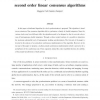Free Online Productivity Tools
i2Speak
i2Symbol
i2OCR
iTex2Img
iWeb2Print
iWeb2Shot
i2Type
iPdf2Split
iPdf2Merge
i2Bopomofo
i2Arabic
i2Style
i2Image
i2PDF
iLatex2Rtf
Sci2ools
108
click to vote
CDC
2010
IEEE
2010
IEEE
Networked clock synchronization based on second order linear consensus algorithms
In this paper a distributed algorithm for clock synchronization is proposed. This algorithm is based on an extension of the consensus algorithm able to synchronize a family of double integrators. Since the various clocks may have different drifts, the algorithm needs to be designed so that it can work also in case of heterogeneous double integrators. Through a robust control analysis it is possible to determine the maximum admissible level of heterogeneity yielding synchronization. The first part of the paper is devoted to the analysis of an unrealistic synchronous implementation of the algorithm. However, in the last part of the paper we propose a realistic pseudo-synchronous implementation which is proved to be a perturbation of the synchronous one. From arguments related the center manifold theorem, the stability of the pseudo-synchronous is finally proved.
Related Content
| Added | 13 May 2011 |
| Updated | 13 May 2011 |
| Type | Journal |
| Year | 2010 |
| Where | CDC |
| Authors | Ruggero Carli, Sandro Zampieri |
Comments (0)

